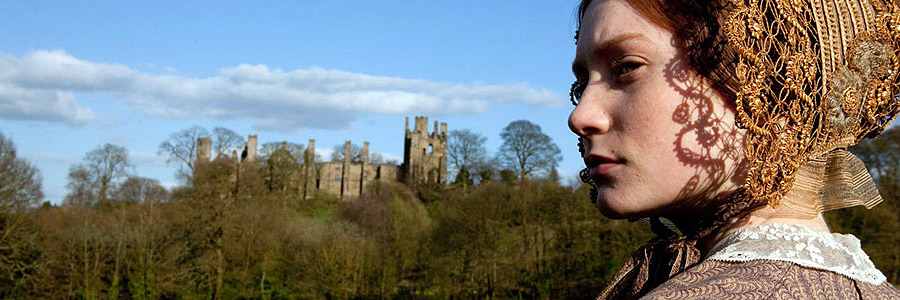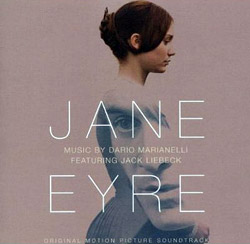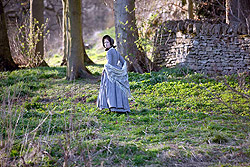
Jane Eyre

JANE EYRE (CD)
Sony Classical
Release date: September 12th, 2011
Running time: 41:08 minutes
Composer: Various
Not being a particular fan of the periodic film, I have never seen any of the many versions of Jane Eyre that have graced the screen over the years, however that is not t say that I never will. If the Original Motion Picture Soundtrack by Dario Marianelli; whose previous works include the soundtracks for films such as The Brothers Grimm (2006), V for Vendetta (2006) and Atonement (2007); are anything to go by, then I believe the film would be worth a watch.
Jane Eyre is an adaption of the Charlotte Bronte book of the same name directed by Cary Fukunaga. Having being orphaned at a young age, Jane (Mia Wasikowska) lives with a rich yet unloving Aunt. Having endured years of taunting and bullying by her cousins, Jane finally cracks, and is sent to Lowood School where life isn’t much better, with the girls being regularly beaten and treated unwell.

Years later, Jane becomes a teacher at the school, before leaving for a job as a child’s governess at a large estate, Thornfield Hall, where she becomes comfortable living in a good home at last. The owner of the estate, Edward Rochester (Michael Fassbender) is rarely home, and the good natured housekeeper, Mrs. Fairfax (Judi Dench) introduces Jane to the household.
Jane finally meets Rochester after three months at Thornfield Hall when she discovers he has fallen from his horse whilst out posting a letter, although she is not yet aware that it is him. Upon being introduced formally that evening, the pair become closer as time goes on and begin to develop a friendship that eventually leads to marriage. Upon the wedding day however, Jane discovers a horrifying secret that tears the relationship apart, and yet again sends her on her travels. Some time later, Jane returns to the estate for a tearful reunion with the man she still truly loves.
The opening tracks have a feel of early music; Wandering Jane combines a low drone with sporadic violin chords and solo voice. It is simple and haunting, creating a pastoral feel and emphasising the vast landscape of the Derbyshire setting. It develops further with a beautiful violin solo over strings. Arrival at Thornfield Hall consists of rising melodies and crescendos of strings, woodwind and harp, although does not quite develop into the grandeur theme that I was expecting with such a title and lead in. The End of Childhood features another graceful violin solo with harp and strings, and is simple yet effective instrumentation to portray the emotion intended.
- 1. Wandering Jane
- 2. A Thorough Education
- 3. Arrival at Thornfield Hall
- 4. The End of Childhood
- 5. White Skin Like the Moon
- 6. A Game of Badminton
- 7. In Jest or Earnest
- 8. “Do You Never Laugh, Miss Eyre?”
- 9. A Restless Night
- 10. Waiting for Mr. Rochester
- 11. Yes!
- 12. Mrs. Reed is Not Quite Finished
- 13. The Wedding Dress
- 14. An Insuperable Impediment
- 15. Jane’s Escape
- 16. Life On The Moors
- 17. The Call Within
- 18. Awaken
- 19. My Edward and I
A Game of Badminton takes a break from the violin solo and passes it to the piano. It is yet again another simple track, with very little complexity harmonically. It is short in length, however any longer and I feel the warmth of this track may have been lost. A Restless Night has a sinister feel created by a contrast of low tremolo strings and long high string notes, combined with electronically enhanced voices and harp. The melodies are very much contrapuntal in composition, and it is one of my favourite tracks of the score as most of the other tracks feature chords that move in unison. It reminds me of walking around an area of unknown in the dark, and the tension felt when only holding a candle light.
Another beautiful piano solo is displayed in The Wedding Dress, shortly after being accompanied by strings and harp with a violin solo progressing the melody further. An Insuperable Impediment has a menacing start of low strings and woodwind, progressing into another violin solo which escalates the piece into an emotional frenzy, with a hint of dispair present.

My Edward and I is the closing track of the score, and combines piano and violin playing in unison, accompanied by strings. It is a perfect ending to the soundtrack which reunites all the previous instrumentation, however it is not so much of a climactic track and rightly so due to the nature of the rest of the score.
The score features the talents of British violinist Jack Liebeck as solo violinist throughout, which was a great choice by Marianelli and an added bonus for Liebeck fans. It is a low key yet simply effective soundtrack, which although doesn’t develop greatly throughout in style and instrumentation, manages to flow throughout the duration effortlessly without losing the listeners interest.
It is quite easily an album you could listen to in the car or the bath as a ‘Chill out’ soundtrack. There is for me no memorable or identifyable theme or melody, but the continuous use of instrumentation and in particular the violin solos stand in for this. It did worry me at times that the lack of variation and melody may draw the soundtrack out too long and become boring; however there was enough development throughout, although it being subtle, to keep me interested and wanting to hear the rest. A perfect soundtrack for this classic story, which now I think I may have to watch.

Phil Blanckley
Phil is a 27-year-old classically trained musician from Sheffield with qualifications in Popular Music, Classical Music and a BA (Hons) in Creative Music Technology and Sound Recording. He likes nothing better than locking himself in the studio and composing music of all genres.
Phil became interested in composing after learning how to play the Cello and Clarinet at a young age, and has never looked back since. His favourite composer is Danny Elfman, whose unconventional harmonies and rhythms in scores such as Edward Scissorhands still manage to bring a tear or two to his eye.
You can find him on Twitter @PhilBlanckley.
© 2022 STATIC MASS EMPORIUM . All Rights Reserved. Powered by METATEMPUS | creative.timeless.personal. | DISCLAIMER, TERMS & CONDITIONS
HOME | ABOUT | CONTACT | TWITTER | GOOGLE+ | FACEBOOK | TUMBLR | YOUTUBE | RSS FEED
CINEMA REVIEWS | BLU-RAY & DVD | THE EMPORIUM | DOCUMENTARIES | WORLD CINEMA | CULT MOVIES | INDIAN CINEMA | EARLY CINEMA
MOVIE CLASSICS | DECONSTRUCTING CINEMA | SOUNDTRACKS | INTERVIEWS | THE DIRECTOR’S CHAIR | JAPANESE CINEMA





